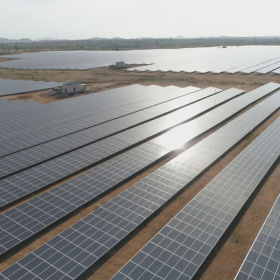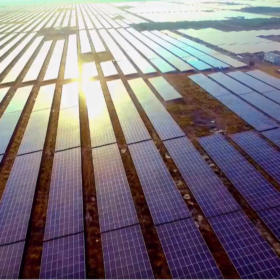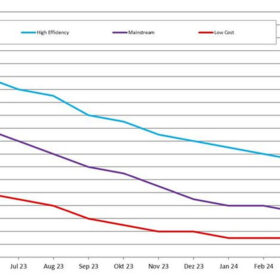Adani chief talks solar and hydrogen storage opportunity
Covid-19 crisis has provided system operators with insights on keeping the grid stable with high levels of renewable penetration. Post Covid-19, this may be the new norm, Gautam Adani said in a LinkedIn post recently.
India’s new solar capacity addition to fall by 23% in 2020
Capacity additions will, however, rebound in 2021 to exceed 2019 levels as the majority of delayed solar projects come online.
Globally, electric vehicles show more resilience than conventional cars during Covid-19 shock
EV sales are set to be 1.7 million off because of the economic fallout of the Covid-19 crisis, however analyst BloombergNEF predicts that will be less of a hit than the anticipated fall in sales of conventional cars, increasing the penetration of electric models into the overall market.
Covid-19 impact: Acme Solar wants to abandon record-low solar price tariff
The developer wants to cancel the power purchase agreement it signed in 2018 for a 600 MW project awarded at a tariff of Rs2.44/kWh, as it fears Covid-19-affected commissioning of the project will stretch beyond the six-month extension from the scheduled date enshrined in the agreement.
Most module makers willing to kickstart cell production—Loom Solar founder
As importing solar cells becomes costlier and time-consuming in the Covid-19 scenario, most of the module manufacturers in India are eyeing solar cell production—says Loom Solar co-founder and director Amol Anand in an interview with pv magazine.
Gujarat announces sops to attract new manufacturing units
Plug-and-production facilities and labour law exemptions for 1200 days are among the decisions announced by the chief minister of the Indian state which contributes 7.9% to India’s gross domestic product and 20% to the overall exports.
Covid-19 can impact electric vehicle demand
Industry body FICCI has recommended an extension of the FAME II Scheme by at least one year to 2023 as it feels change in the consumer behavior can impact the demand for electric vehicles (EVs) in the short term.
Drones can drive down operational solar costs—Frost & Sullivan Interview
The market for drones in the power and utility industry will grow 23.6% annually, reaching $515 million by 2030—according to a Frost & Sullivan report.
The report, Drones in the Global Power and Utilities Industry, Forecast to 2030, cites ongoing digital transformation, remote monitoring, and the need to optimize operational costs as the factors driving increasing adoption of drones in the power and utility industry.
“Drones minimize the need to send human employees onsite and can be deployed for monitoring, operations, and maintenance services. As the global power and utility industry continues to tackle the impact of the ongoing Covid-19 pandemic, drones can be potential game-changers in combating the challenges it poses,” as per the report.
pv magazine spoke to Supreeth Srinivasa Rao, Associate Director, Industrial Practice, Frost & Sullivan, to find out the role of drones in the solar sector, especially for India.
MicroSun Solar resumes module manufacturing operations
The Bengaluru-based solar module manufacturer, which has a state-of-the-art facility with capacity of 150 MW per annum, had closed the operation of its units since March 24 after the government announced lockdown to contain Covid-19 spread.
Covid lockdown: Thermal power generation hit, renewable continues unabated
India Ratings says the power demand declined for March and April 2020, taking a hit on generation from thermal sources as renewables continued to enjoy ‘must run’ status.














